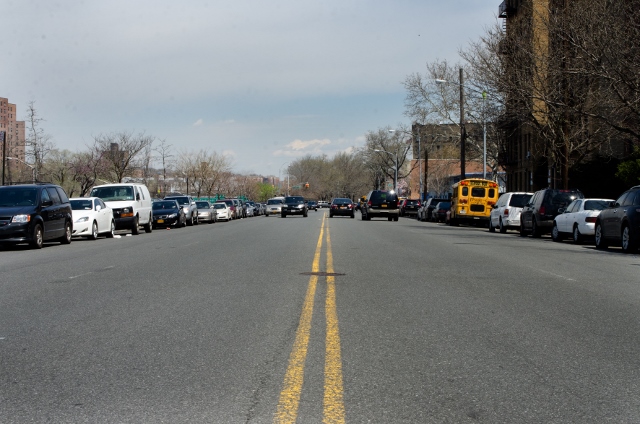
Photo by Jenny Sharp
By JENNY SHARP
Concerned residents describe Bailey Avenue in Kingsbridge as a hotbed of logistical dysfunction and a hazard to public safety.
At a Community Board 7 general board meeting on April 21, two residents painted a picture of the residential and commercial street, often treated like a parkway rife with speed, traffic, and little regulation.
The stretch of road, running parallel to the Major Deegan Expressway, extends nearly a mile from West 225th Street to Sedgewick Avenue without a stoplight. Flanking the other side of Bailey Avenue are residential homes, businesses, and PS 310, resting at the corner of Bailey Avenue and West Kingsbridge Road. Longtime resident Helene Wilson, who has lived in the area for 25 years, was the most vocal at the Board meeting over her frustrations with the state of Bailey Avenue.
Among her complaints were traffic, speed, illegal car washes operating on the street, and 18-wheelers taking up parking spots and leaving their rigs for extended periods of time. Drag races have been known to happen there, with lack of regulation, traffic lights, and police presence. “We used to have police officers that used to sit back here and clock the speed,” said Wilson in a follow-up phone interview. “Now this is a dead spot, a real dead spot.”
The Police Department and the Department of Transportation have installed a speed enforcement camera that’s functional when school is in session. There is also a crossing guard outside PS 310 who directs traffic at the start and end of each school day.
Wilson is adamant that these measures are not enough, saying that the intersection at 225th Street near the school needs more than one crossing guard to properly protect the children and that the camera does very little to reduce speed. “I don’t see any change.”
The office of Councilman Fernando Cabrera, whose district Bailey Avenue falls in, confirmed that this thoroughfare is both a known problem and also a concern for Cabrera. Chief-of-Staff Greg Faulkner said Bailey Avenue is high on the office’s list of areas that need more attention, but that many efforts have been bogged down by bureaucracy. “I wish it was easier and we could make that decision locally,” he said, explaining that requests for security cameras must be submitted to the police headquarters at One Police Plaza for the final decision. Similarly, the installation of a new stoplight is a federal matter and must comply with the government standard. Before tools such as speed bumps can be implemented, the Department of Transportation dispatches an assessor to the area to determine whether these additional steps would help or hurt the flow of the street.
But while the issues described by Wilson are detrimental to quality of life, they are not life-threatening. Faulkner explained that Cabrera’s requests for security cameras on Bailey Avenue have been consistently denied in favor of areas with higher rates of more violent crime. “Folks need to let us know when these things are happening,” said Faulkner, explaining that reporting complaints to the 311 hotline helps representatives prove necessity to bureaucratic entities. “Homeowners should get involved,” he said, because it “provides additional eyes and ears.”





This city needs extensively more aggressive traffic calming.
How many need to die?